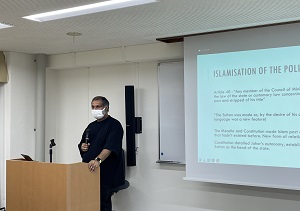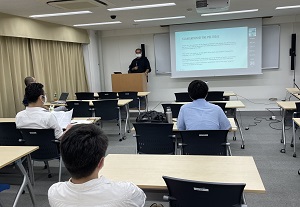The Tobunken Seminar "Asiatic Imperial Constitutional Making – Legal Borrowings from the Ottomans by the Asiatic World" was held both in person and online on August 4, 2022, attended by 6 in-person participants and about 20 online participants.
Doctor Yakoob Ahmed, visiting fellow at the Institute for Advanced Studies on Asia, the University of Tokyo, gave a lecture on the interconnectedness between the constitutional making in the Ottoman Empire, Japan, China, and Johor and discussed how the latter three saw the Ottoman experience and whether there were "Asian" features in the constitutional process in these states.
 |
 |
Date and time: August 4, 2022 (Thu) 15:30~17:00
Venue: Large meeting room (3rd floor), Institute for Advanced Studies on Asia, the University of Tokyo/Zoom
Speaker: Yakoob Ahmed (Istanbul University/The University of Tokyo)
Title: Asiatic Imperial Constitutional Making – Legal Borrowings from the Ottomans by the Asiatic World
Moderator: Jun Akiba (Institute for Advanced Studies on Asia)
Abstract:
This presentation will examine how the Ottoman Empire’s discursive constitutional efforts influenced the Malaysian state of Johor, Meiji Japan and Qing China's attempts for their own indigenous constitutions. By examining these constitutional processes, inspecting the various moving Asian elites and monarchs – who travelled to each other’s nations, as well as surveying the multiple legal terminologies that were applied, one can deduce that there was space for modern Asian constitutions that needn’t be “Western”. These sovereign states were negotiating with the intervening of colonial law but at the same time consolidating their existence globally and locally through the framework of their own traditions. This included the role of the various Asian religions/traditions such as Islam, State-Shintoism, Buddhism, and Confucianism in international law-making. For the Asian states mentioned, it is worth asking how they viewed the Ottomans. Did they see them as European, an alternative or alien? And how did they witness Ottoman constitutional efforts as a lesson for their own attempts towards constitutionalism? As a result, this presentation will ask how informative was “Ottoman modernity” and the Ottoman constitution as a possible alternative to the Western European models.
